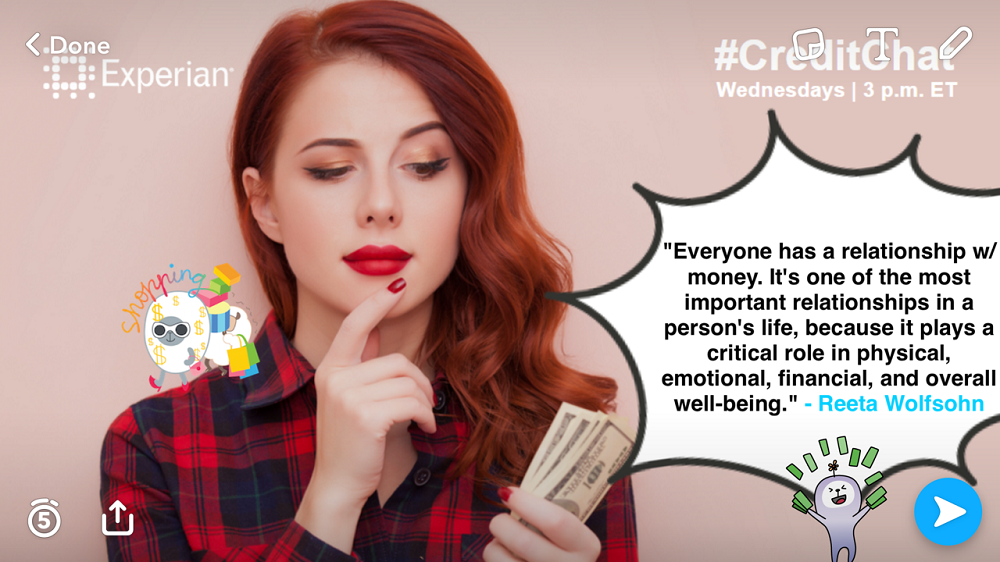Debt Shame: Ways to Deal with Guilt & Anxiety Due to Debt
Join our weekly #CreditChat on Periscope, Facebook Live, YouTube Live, Twitter, and Snapchat every Wednesday at 3 p.m. ET. This week, we talked about ways to deal with debt shame. The panel will include: Marsha Barnes: Founder of The Finance Bar, Rod Griffin: Director of Public Education at Experian and Mike Delgado: Director of Social Media at Experian.
To keep up with future chats — or to suggest topics — please join our #CreditChat group on Facebook. We’d love to have you join us.
View the Complete Tweetchat via Storify
We’re also featuring financial tips all week on Snapchat — including: 4 Ways to Deal with Debt Shame.
6 Ways to Deal With Debt Shame and Take Control of Your Finances
Face Your Situation Head-on
Sometimes the shame people feel about their financial situation will cause them to avoid it altogether. This will only escalate the situation. Take proactive steps to gain control of your finances by taking stock of how much debt you are in and who you owe. If you are unsure where to start, request a free copy of your credit report. By law, you are entitled to free copies of your credit reports from Experian, TransUnion and Equifax every 12 months. Get yours at AnnualCreditReport.com.

Talk to Your Loved Ones About Your Shame
This is a tough, but important step in your journey to overcome debt shame. Coming clean with your loved ones about your situation and the shame you are feeling will allow them to support you and help you to avoid spending temptation. You will feel like a weight has been lifted from your shoulders.

Create a Realistic Budget
Oh no… it’s the dreaded “B” word! Budgets are important, because they put you in control of your money. Your budget should include your housing expenses, gas, food, utilities, bills, savings, and a little bit of fun money. This is also a great time to see if you can cut out certain bills or find cheaper options.

Create a Debt Payment Plan
So you’ve figured out who and what you owe, now it’s time to set the wheels in motion. Prioritize your debt. Some people prefer to tackle high interest debt first (Avalanche method), while others prefer to start with their lowest balance (Snowball method). Do whatever works best for you. If you are at a point where you are still feeling hopeless, you may want to talk to a non-profit credit counselor.

Set Mini Goals
The idea of getting completely out of debt can seem daunting and sometimes unattainable. Mini goals will help you to stay the course. These goals can include: Sticking to your budget for three months, paying off your first credit card, saving a certain amount for emergencies, or even your first month without collection calls.

Ask for Help
If you feel as though you’ve reached the point of no return with your debt or you’re just really lost on where to start, don’t be afraid to seek help. We recommend talking to a non-profit credit counselor. The National Foundation for Credit Counseling is an excellent resource.


Questions We’ll Discuss:
- Q1: What is debt shame?
- Q2: How can your debt shame affect your relationships with family or a significant other?
- Q3: Are there symptoms of debt shame that people should be aware of?
- Q4: What can people do to avoid debt shame?
- Q5: What can people who are experiencing debt shame do to overcome it?
- Q6: Should people experiencing debt shame seek professional help?
- Q7: How can you help a significant other who refuses to talk to you about their debt?
- Q8: How can parents help a child who is experiencing debt shame?
- Q9: What resources are available for people who want to take their financial matters into their own hands?
- Q10: Any final tips for people experiencing debt shame?
If you’ve never heard about #CreditChat, here is a brief overview:
Relevant chats on YouTube:
- Ways to Control Emotional Spending
- How to Juggle Debt & Retirement
- How to Pay Down Credit Card Debt Faster
- How to Eat Healthy (Without Breaking the Bank)
- How to Throw a Fun Dinner Party on a Budget
Relevant Articles:
- Your Money Secrets are Killing You – Liz Weston
- The Scary Link Between Credit Card Debt & Depression – Time
- How Your Student Debt Can Make You Sick & Depressed – Forbes
- Does Credit Card Debt Lead to Depression? – CNBC
- The Emotional Effects of Debt
- Debt & Depression: Causal Links and Social Norm Effects [Research]
- Debt & Depression [Research]
- Severe Debt Can Cause Depression & Even Suicide
- Debt is Not a Death Sentence